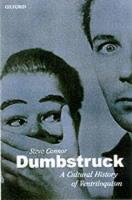


|
|
| book details |
Dumbstruck - A Cultural History of Ventriloquism
By (author) Steven Connor

|
This book is currently unavailable. Enquire to check if we can source a used copy
|
| book description |
Why can none of us hear our own recorded voice without wincing? Why is the telephone still full of such spookiness and erotic possibility? Why does the metaphor of ventriloquism, the art of ""seeming to speak where one is not"", speak so resonantly to our contemporary technological condition? These are the kind of questions which impel Steven Connor's history of ventriloquism and the disembodied voice. He tracks his subject from its first recorded beginnings in ancient Israel and Greece, through the fulminations of early Christian writers against the unholy (and, they believed, obscenely produced) practices of pagan divination, the aberrations of the voice in mysticism, witchcraft and possession, and the strange obsession with the vagrant figure of the ventriloquist, newly conceived as male rather than female, during the Enlightenment. He retrieves the stories of some of the most popular and versatile ventriloquists and polyphonists of the 19th century, and investigates the survival of ventriloquial delusions and desires in spiritualism and the ""vocalic uncanny"" of technologies like telephone, radio, film, and internet This book is intended for cultural historians, especially those
| product details |
Normally shipped |
Publisher | Oxford University Press
Published date | 26 Oct 2000
Language |
Format | Hardback
Pages | 458
Dimensions | 242 x 165 x 30mm (L x W x H)
Weight | 865g
ISBN | 978-0-1981-8433-1
Readership Age |
BISAC | performing arts / puppets & puppetry
| other options |
|
|
|
To view the items in your trolley please sign in.
| sign in |
|
|
|
| specials |
|
|

|
Carlo Rovelli
Paperback / softback
224 pages
was: R 295.95
now: R 265.95
|
Originally published in Italian: L'ordine del tempo (Milan: Adelphi Edizioni, 2017).
|

|
Carlo Rovelli
Paperback / softback
208 pages
was: R 295.95
now: R 265.95
|
|
|
|
|